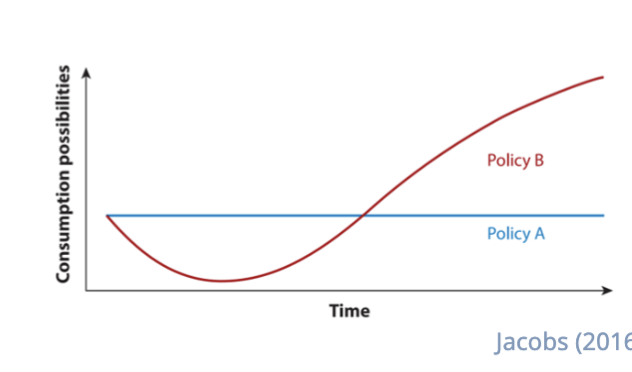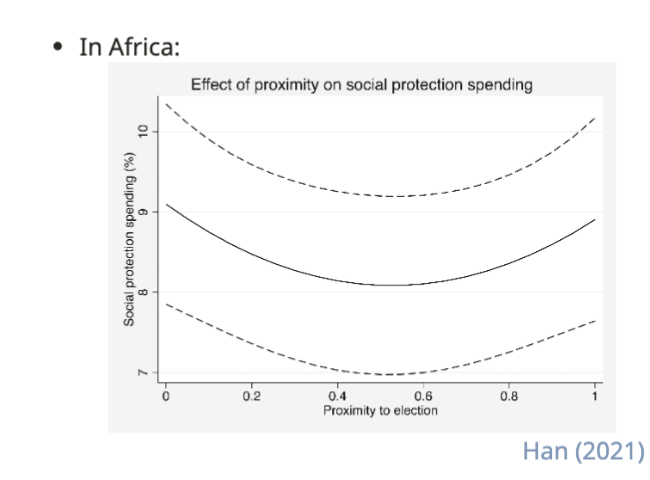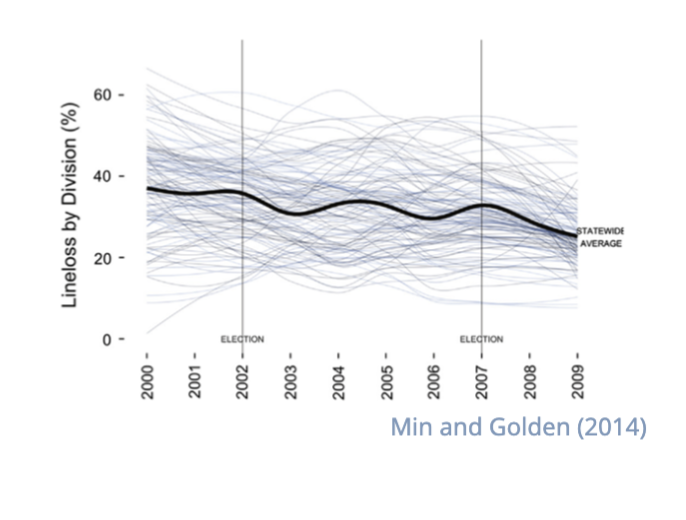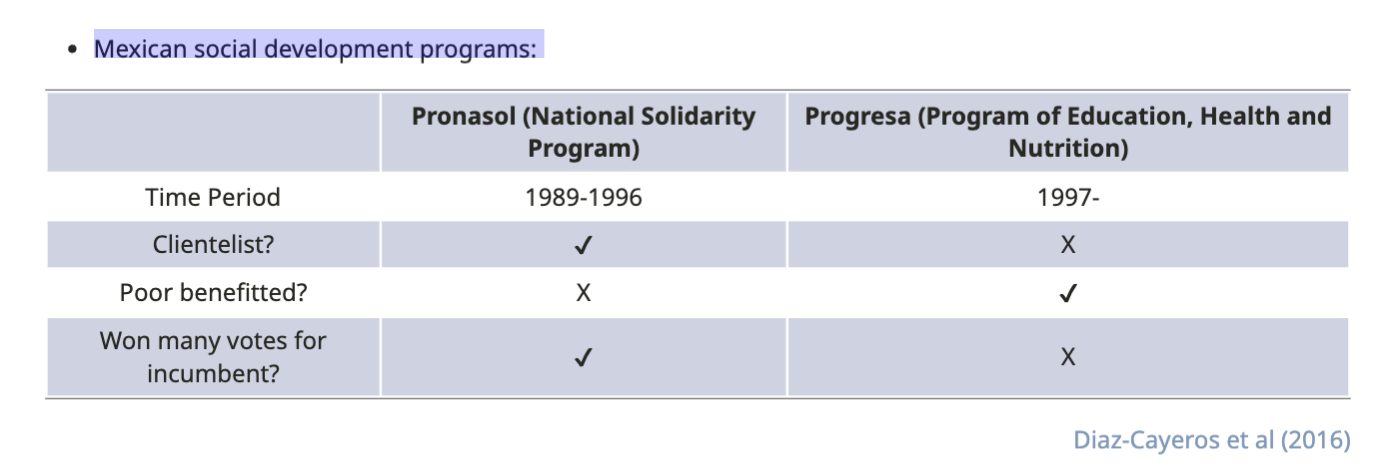Class 8: Breaking the Rules - Clientelism and Corruption
1/12
There's no tags or description
Looks like no tags are added yet.
Name | Mastery | Learn | Test | Matching | Spaced | Call with Kai |
|---|
No analytics yet
Send a link to your students to track their progress
13 Terms
1. Electoral Distortions
democracy promotes broader development by
1) 1. Accountability for politicians in enforcing therules and delivering development
2. Credibility for the protection of (property) rights
Eg.
Democracy benefits health:Increased life expectancy McGuire (2010)
Greater calorie consumption Blaydes and Kayser (2011)
Longer democracies reduce infant mortality Gerring et al (2012)
question: are there any developmental tasks democracies are particularly bad at?
we only care abt things that happened today —> politicans focus on things today
getting a majority takes a while to form a coalition
these challenges are motivated by clientelism, corruption
1. Electoral Distortions
1. A short-term bias
Even well-meaning politicians need to worry about re-election in 4 years' time
Less attention to climate change, pensions for ageing populations
Commitment problems: Why invest now if my successor might cancel it
Especially as successors prefer to claim credit for their own idea

depends on when the election is for policy a and policy b
for climate change the costs are now and benefits are later = for a politician this is stupid
long term challenges are difficult for democracies to meet
2. An electoral cycle
Voters remember recent events more sharply
So politicians concentrate their investments and stimulate the economy just before and election
things that happened a long time ago don’t affect politicians
policians save for policies when it comes near the elections, so they can reward us
Unpaid electricity bills spike by 3% points inelection years in Uttar Pradesh, India
Forbearance to consumers andbusinesses for electoral suppor

example: spending is taking away and ramped up when the election comes

people dont have to pay closer to the election= debates on the electoral cycle
3. A 'concrete' bias
Development requires many 'hidden' inputs,eg. teacher training, management, oversight, maintenance
But politicians invest only in what voters can see and reward: Concrete buildings, ribbon-cutting events
ex: no one cuts ribbons when teachers are getting trained , these less visible activities are not visible
they only invest in visible concrete things like clinics and schools
many villages have too many schools, but are not maintained
build to get political credit
Democratization in Africa led to the abolition of school fees and many more children in schools, but no investment in quality
no quality because parents can’t see it
quantity>quality
2. Clientelism
Clientelism: the contingent exchange of material benefit for political support
ex: you vote for me you get 20$: it is a deal. each party is contingent
citizens: material benefits
politicians: political support
Rules for neutral distribution exist on paper
Eg. everyone has a right to healthcare
But are broken/twisted in practice
Bureaucrats, politicians use discretion to control access
Local Brokers monitor who you support/vote for
so they know who voted for who
Access to healthcare depends on who you vote for
A 'quid pro quo' between patron and client; an unequal exchange
Varieties of Clientelism
Patronage: Distributing public jobs (the opposite of autonomy/meritocracy)
clientelism w/ jobs
Vote-buying: Gifts, cash or services for votes
Relational: Long-term ties of trust between parties and voters
ex: you can go to that politicans if someone in your family gets sick
How does clientelism affect development?
theres a trade off between good and bad , but generally bad for development
Clientelism harms public services:
1. Private goods over more efficient public goods
Handouts instead of infrastructure
2. A patronage bureaucracy has less autonomy
In Brazil, students' test scores get worse when a new party replaces temporary teachers (Akhtari et al 2017)
3. A lack of accountability
Voters must vote for their patron, not the best candidate
Inverts democratic accountability (Stokes2005)
if we don’t have a pressue to do well maybe the politicians will be more corrupt
4. Property rights protection is less credible
In Côte d'Ivoire, land rights depended on who you voted for (Boone 2009
contingent on your support because the gov doesn’t provide this right (wheras democracy does).
Are bureaucrats to blame? clientelism
Donors often use aid to do 'capacity building' to reduce clientelism
Training for bureaucrats
New IT system
Revising institutional rules
New organizations
But capacity building just makes bureaucracies more efficient at clientelism
The political incentives haven't change
it makes them actually more capable, theres still votes to be won through clientelism
clientelism
Are voters to blame?
Are voters to blame?
Voters do demand clientelism
because theres no alternative
It depends on the alternative:
example: "voters know if you promise them good gov and infrastructure they can’t deliver so they ask for material benefits like rice where you can guarantee it
everyone goes w clientelism cuz gov cant provide public goods
The opposite of clientelism is 'Programmatic' politics
Politicians offer distinct programs: policies and public goods
Can target groups of citizens, eg. women, the poor
Based on their objective socio economic characteristics
Not their political behaviour

example: Mexican social development programs
before pronasol (clientelism) effective to win votes
progresa (w/o clientelism): not as good as getting votes but has poverty reduction
How does democracy affect clientelism
Democracy encourages programmatic parties and broad appeals using public goods
Eg. the PAN in Mexico
The Workers' Party (PT) in Braz
= helps improve quality of governance
In Mexico, democratization led to more programmatic social policies
The state had the capacity to deliver and monitor Progresa/Oportunidades
Threat of violence if clientelism continued - Zapatista Rebellion
rebels against clientelism
The opposition controlled the legislature so could constrain the government's discretion
OR
in africa competitive clientelism where theres more clientelism
Democracy creates 'competitive clientelism'(Lindberg and Morrison 2008)
Nigeria, Kenya
An incumbency advantage in resources for clientelism
= accelerated clientelism
=clientelism can harm development and programmatic policies are prob better. Democracy alone is not enough
3. Corruption
Definition: Corruption
The misuse of public power for personal gain
Bribery
Extortion
Fraud
Kickbacks
Collusion
Petty Corruption
for any service you pay
Bribes to police to pass a roadblock
Bribes to get a driving license faster
Average payment is twice the official price in India (Bertrand et al 2008)
Drivers don't really take the exam -> Unsafedrivers
Grand Corruption
'Carwash' ('Lava Jato') in Brazil: contractors for Petrobras colluded on how much to bid, raising prices and channeling >US$ 2bn to politicians
Goldenberg in Kenya: Fake importing of US$1bnof gold and diamonds paid for by Central Bank tofinance election campaign
imported gold and diamond but didn’t actually import it
Anglo-Leasing in Kenya: $740m in Up-front payments for security services never delivered; redirected to politicians
1MDB in Malaysia: US$ 4.5bn laundered from government development corporation, channeled to Prime Minister Najib Razak and his party,UMNO
Truong My Lan in Vietnam: US$44bn of loans,93% of Saigon Commercial Bank's lending, to its main owner to buy real estate
corruption : Imagine Kenya has launched a 'Zero corruption' reform
1. Will this work?
2. Will it boost development?
Corruption harms development
1. Wasting scarce resources
US$ 3.6tr per year, 5% of global GDP
Uganda 1991-95: Only 13% of budgeted funds reach schools
because investments require money to get benefits later
you waste investment opportunities
less money for education and health care
2. Discouraging investment and merit
Corruption demands prevent construction being completed (or started)
Bureaucrats pay for jobs where they can be corrupt (Wade 1982
3. Weakening institutions
By definition, corruption is rule-breaking
How you're financed -> how you govern
Eg. Bangladesh Rana Plaza collapse 2013 -corruption led to safety standards being violated
Eg. Donor-funded mayors in Colombia have double the rate of deforestation due to not enforcing environmental rules (forbearance)(Harding et al 2023)
4) Undermining trust
Eg. Bárcenas scandal, Spain, 2013
where does corruption come from?
But Corruption may be a symptom of weak institutions and a weak state
Rather than a root cause
Corruption is useful for citizens in developing countries to address systemic problems:
1. Corruption can help protect property rights
Paying off the police secures your investment
ex: corruption allowed to get rana plaza building
ex: historically many investments in the west happened because of corruption
2. Corrupt politicians have more power for enforcement
Being tough/corrupt can help deliver projects where there's no embedded autonomy
Voters support corrupt candidates (Vaishnav2017)
If 10% is stolen, what happens to the 90%
corruption can actually help enforce some rules
politicians know how to corrupt people and they can even use violence to threaten bureaucrats to do their job
theres a difference on corruption that allows for some investments vs a person that keeps all the money
3. Corruption is electoral campaign financing
Essential to political competition where there's no public funding
most developing countries don’t have money to finance parties/politics so they need it
ex: Electoral cycles in corruption
Politicians need lots of cash in the weeks before an election
In Russia, sourced from firms with public procurement contracts (Mironov and Zhuravskaya 2011
4) Corruption is an informal institution that be comes normalized
More than a third of people in Mexico and Nigeria say that other people believe it is okay to pay a bribe (Agerberg 2021)
because its widespread and systemic
if corruption is systemic, a social norm, and a symptom of deeper problems:
Anti-corruption efforts mostly will not work
Strict formal rules don't change systemic norms/incentives
Can a corrupt system reform itself?
Strong incentives for isomorphic mimicry
Targeting corruption may do nothing to strengthen the underlying institution/state
Despite decades of anti-corruption projects in Sub-Saharan Africa:
gets worse ; cuz the whole system is based on it
example: you can have corruption and int development
Corrupt' countries can develop quickly, eg. China, the West
corruption helped grease the wheels and help protect us
this is also how the west got rich
If investment happens despite corruption
The corrupt have their investments protected
If the weakness of the state and institutions is addressed by deeper political processes
Does democracy increase corruption?
New democracies have weak institutions:
More competition -> More electoral financing needed -> More corruption
Authoritarian Kenya was less corrupt because leaders limited corruption to 'enlarge the pie' (Mwangi 2008)
Democracy makes corruption 'visible': NGOs and Free Media
Undermining legitimacy
In consolidated democracies:
Active anti-corruption agencies with autonomy
Institutions and the rule of la w are strengthened with a rich state
Free media, free speech, civil society are effective
Informal institutions (social norms) against corruption62 / 63
Conclusion
1. Electoral Distortions
Even if democracy boosts social services overall...
Short-termism, electoral cycles and a 'concrete' bias harm the quality and sustainability of development
2. Clientelism
Buying votes harms accountability and weakens public services
Programmatic politics reduces poverty but relies on specific types of democratic competition
3. Corruption
Discourages investments and weakens institutions
But may just be a symptom of weak institutions and a weak state
Eliminating corruption is not necessary or sufficient for development